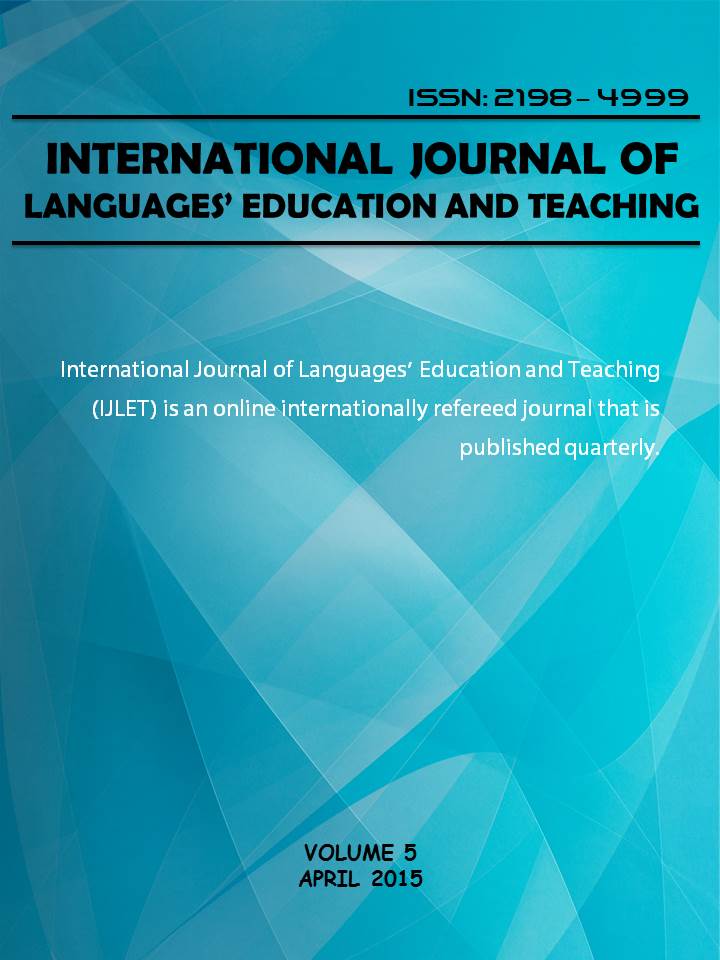Author :
Abstract
Keywords
Abstract
By the help of innovative teaching practices, practitioners of education try to effectively amalgamate innovative media technologies into students` learning processes and activities. The best practices can be found in the cases where traditional ways of teaching and new media available are blended by transforming pedagogy and enabling productive ways for students to express themselves. In this respect, English as a Foreign Language (EFL) Teaching is no exception and, over the last few years, digital storytelling has entered into the agenda of language teaching practitioners as a powerful teaching and learning tool that enables both teachers and students to communicate in a digitally rich environment. Throughout the paper it is argued that digital storytelling has the potential of reaching far beyond the field of communication and that digital storytelling can be exploited as a versatile device to enable students to dwell on their creativity by making them involved in a digitally rich environment. The present paper also reports the findings of a qualitative study designed to explore how students weave fictional stories into a media enriched environment, and how the use of a particular software sparks the creative writing among EFL students. The findings through archival documents and semi-structured interviews revealed that the use of digital storytelling is very likely to improve the EFL students’ writing skills.
Keywords
- Adams, C. (2009). Digital storytelling. Retrieved fromhttp://pdc- connection.ebscohost.com/c/articles/45616549/digital-storytelling.
- Apperley, T. & Beavis, C. (2011). Literacy into action: Digital games as action and text in the English and literacy classroom. Pedagogies: An International Journal, 6:2, 130-143. doi: 10.1080/1554480x.2011.554620.
- Arispe, K. & Blake, R.J. (2012). Individual factors and successful learning in hybrid course. System, 40, 449-465. doi: 10.1016/J.system. 2012.10.013
- Ciekanski, M. &Chanier, T. (2008).Developing online multimodel verbal communication to enhance the writing process in an audio-graphic conferencing environment. ReCALL, 20 (2), 162-182. doi: 10.1017/S0958344008000426.
- Conole, G. (2008). Listening to the learner voice: The ever changing landscape of technology use for language students. ReCALL, 20 (2), 124-140. doi: 10.1017/S0958344008000323.
- Curno, B. (2003). Information and communication technology and the teacher of future in C. Dawling and L. K. Wing (eds.). The teacher profession: A networked profession in new networked environments. Boston: Kluwer Academic Publishers.
- Domingo, M. (2014). Transnational language flows in digital platforms: A study of urban youth and their multimodal text making. Pedagogies: An International Journal, 9:1, 725. doi: 10.1080/1554480x.2013.877554.
- Dudeney, G.,& Hockley, N. (2012). ICT in ELT: how did we get here and where are we going?. ELT Journal, 66(4), 533–542. doi:10.1093/elt/ccs050
- Fidaoui, D., Bahous, R., &Bacha, N.N. (2010). CALL in Lebanese elementary ESL writing classrooms. Computer Assisted Language Learning, 23 (2), 151-168. doi: 10.1080/09588221003666248.
- Gregori-Signes, C. (2008). Integrating the old and the new: Digital storytelling in the EFL language classroom. GRETA, 16(1), 29–35.
- Hwang, W.Y., Chen, H., Shadiev, R., Huang, R., & Chen, C. (2012).Improving English as a foreign language writing in elementary schools using mobile devices in familiar situational contexts. Computer Assisted Language Learning.doi: 10.1080/09588221.2012.733711
- Johnstone, K. M., Ashbaugh, H., &Warfield, T.D. (2002).Effects of repeated practice and contextual-writing experiences on college students’ writing skills. Journal of Educational Psychology,94, 305–315.doi:10.1037/0022-0663.94.2.305
- Jones, R. E. (2001). A consciousness-raising approach to the teaching of conversational storytelling skills.ELT Journal,55(2), 155–163.doi: 10.1093/elt/55.2.155
- Kellogg, R. T.,& Raulerson, B. A. (2007).Improving the writing skill of college students. Psychonomic Bulletin & Review, 14(2), 237–242.doi: 10.3758/ BF03194058
- McLellan, H. (2006). Digital storytelling in higher education. Journal of Computing in Higher Education, 19(1), 65–79.doi: 10.1007/BF03033420
- Mullen, R., & Wedwick, L. (2008).Avoiding the digital abyss: Getting started in the classroom with youtube, digital stories, and blogs.Heldref Publications, 82(2), 66–69.
- Ohler, J. (2005). The world of digital storytelling.Educational Leadership, 63(4), 44–47.
- Otlowski, M. (1998). The writing process and CALL: Hypermedia software for developing awareness of structure in writing. Computer Assisted Language Learning, 11(4), 419425. doi: http://dx.doi.org/10.1076/call.11.4.419.5673
- Raymond, S. (2008). Digital storytelling in the classroom. Computers and Composition, 25, 449–452. doi:10.1016/j.compcom.2008.04.010
- Robin, B. R. (2008). Digital Storytelling: A powerful technology tool for the 21st century classroom. Theory into Practice, 47, 220–228.doi:10.1080/00405840802153916
- Sadik, A. (2008). Digital Storytelling: A meaningful technology-integrated approach for engaged student learning. Educational Technology Research and Development, 56(4), 487–506.doi:10.1007/s11423-008-9091-8
- Sylvester, R., & Greenidge, W. (2009). Digital Storytelling: Extending the potential for struggling writer. The Reading Teacher, 63(4), 284–295. doi:10.1598/RT.63.4.3
- Strauss, A., &Corbin, J. (1990). Basics of qualitative research: Grounded theory procedures and techniques. London: Sage.
- Tan, E.K., Ng M.L.Y. & Saw, K.G. (2010). Online activities and writing practices of urban Malaysian adolescents. System, 38, 548-559. doi:10.10.16/J.system.2010.09.014
- Ware, P. (2008).Language learners and multimedia literacy in and after school. Pedagogies: An International Journal, 3:1, 37-51. doi: 10.1080/15544800701771598.
- Xu, Y., Park, H., & Baek, Y. (2011). A new approach toward digital storytelling: An activity
